Tag: immigrant
Gladis Clemente – Advocate Profile
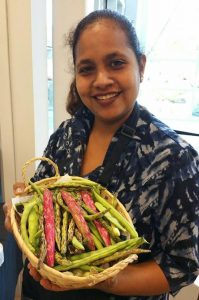 Civic advocacy is in her blood.
Gladis grew up in a small town outside of Acapulco in Mexico where her father was elected mayor not just once but three times. Politicians have a reputation for being rich and out of touch with their constituents in Mexico. Contrary to this, her parents came from a humble lifestyle and always stayed close to their community. Gladis remembers her parents explaining that she would attend public school because education is the most powerful way to change the world. Now, Gladis carries the lessons from her parents into her work with in the US.
Gladis joined FIN in 2016 as an advocate because she wanted to work on closing the opportunity gap in South King County communities. Although being a FIN advocate was her first paid job in the US, Gladis has worked hard as a mother, volunteer, and advocate for education reform. Even in the last year, she has been organizing, speaking up, and making connections like crazy. In March of 2017, Gladis participated in a FIN Government 101 training where she connected with Washington CAN, a local advocacy group. She’s since partnered with them to advocate for education reform like universal pre-school, increased funding for dual language programs, and support for immigrant parents.Meanwhile, she’s also become known in the FIN office as the go-to person for budgeting after she volunteered to learn about budgeting for the advocate program.
Civic advocacy is in her blood.
Gladis grew up in a small town outside of Acapulco in Mexico where her father was elected mayor not just once but three times. Politicians have a reputation for being rich and out of touch with their constituents in Mexico. Contrary to this, her parents came from a humble lifestyle and always stayed close to their community. Gladis remembers her parents explaining that she would attend public school because education is the most powerful way to change the world. Now, Gladis carries the lessons from her parents into her work with in the US.
Gladis joined FIN in 2016 as an advocate because she wanted to work on closing the opportunity gap in South King County communities. Although being a FIN advocate was her first paid job in the US, Gladis has worked hard as a mother, volunteer, and advocate for education reform. Even in the last year, she has been organizing, speaking up, and making connections like crazy. In March of 2017, Gladis participated in a FIN Government 101 training where she connected with Washington CAN, a local advocacy group. She’s since partnered with them to advocate for education reform like universal pre-school, increased funding for dual language programs, and support for immigrant parents.Meanwhile, she’s also become known in the FIN office as the go-to person for budgeting after she volunteered to learn about budgeting for the advocate program.
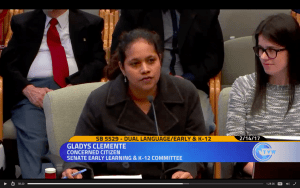
“We must educate people to change the system. Get them to see reality is on both sides....We must prioritize civic engagement.”
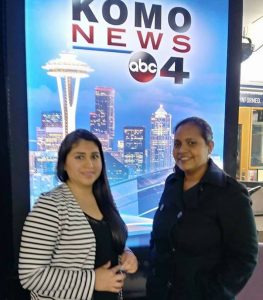 There are many issues she advocates for but ultimately, Gladis says the most important thing to get others to speak up as well. Over the last year, she has gained confidence and overcome her own barriers of public speaking in a mixed community. She thinks back to the first time she spoke in front of lawmakers in Olympia and knows how intimidating it feels. She believes that if more people speak up, lawmakers will listen – but the challenge is in getting people to talk. This is part of what makes Gladis such an effective community advocate, she sees the value in both helping people and working to change the system at the same time.
There are many issues she advocates for but ultimately, Gladis says the most important thing to get others to speak up as well. Over the last year, she has gained confidence and overcome her own barriers of public speaking in a mixed community. She thinks back to the first time she spoke in front of lawmakers in Olympia and knows how intimidating it feels. She believes that if more people speak up, lawmakers will listen – but the challenge is in getting people to talk. This is part of what makes Gladis such an effective community advocate, she sees the value in both helping people and working to change the system at the same time.
Gladis wants people to know that it’s possible for people to create their own opportunities. The only way to make a difference is to walk through a door and become involved – ask questions and volunteer to help out. Anyone can make a difference in a community.
Swahili Food Seattle
Startup Q&A: Swahili Food Seattle
 Benson, Owner of Swahili Food Seattle[/caption]
Benson, Owner of Swahili Food Seattle[/caption]
Q: Tell us about your business?
I cater East African food across King County communities. I cater small occasions, birthdays, graduations, small parties and individual meal orders. The African community loves my food because it meets their cultural appetite and is affordable. I’ve found there is a lot of interest in Kenyan cuisine outside the African community as well and I always enjoy meeting people who want to try African foods.Q: How did you get the idea for your business? What inspired you to start this business?
I saw that many Kenyans were getting very busy and did not have time to cook traditional meals. I worked in the food industry back in Kenya and have always loved to cook, I realized I could fill that need. I was number four in a family of twelve, I started cooking at a young age and everyone in my family loved my food. When I came to America, I saw that many Kenyans were busy and did not have time to cook traditional meals. The idea to start a catering business came very easily to me and I did not enjoy any other kind of job when I came to America. When I talked to family and people who knew me back in Kenya, they would always tell me I needed to start a Kenyan food business.Q: What makes you different from other types of African restaurants and caterers?
[caption id="attachment_1658" align="alignright" width="300"] Chapati, Samosas, and Goat Stew[/caption]
My recipes are based on traditional Kenyan dishes but I improvise changes that give them a local Seattle flavor as well. I learned to cook from generations of family traditions and have carried these traditions with me to America. My cooking is made from organic produce and fresh spices from Africa’s spice capital of Zanzibar – you will not be able to have only one taste.
I also cater to special needs and my clients’ timeline – responding to calls and making deliveries outside normal business hours
Chapati, Samosas, and Goat Stew[/caption]
My recipes are based on traditional Kenyan dishes but I improvise changes that give them a local Seattle flavor as well. I learned to cook from generations of family traditions and have carried these traditions with me to America. My cooking is made from organic produce and fresh spices from Africa’s spice capital of Zanzibar – you will not be able to have only one taste.
I also cater to special needs and my clients’ timeline – responding to calls and making deliveries outside normal business hours
Q: What do you like best about your work?
Flexibility, the joy of seeing people appreciate my food and services, I enjoy interacting with people and sharing the experience and food from my culture. It is always fun to meet people who have visited Kenya and for those who can’t make it all the way to Africa, I am pleased to bring my culture to them.Q: What is your business’ biggest challenge?
I am trying to grow my business so I can have my own commercial kitchen. I don’t want to run a restaurant but instead to provide catering services and supply local restaurants and grocery stores with fresh Kenyan food. In order to do this, I need capital to buy equipment and, eventually rent a large space to work from. I am challenged by financial resources to grow my business, hire staff, and expand my business ideas. For now, I am focusing on building my catering business and marketing to new customers.Q: What is something people might be surprised to learn about you or your business?
That I never went to school to learn cooking skills, they can’t understand how I taught myself to cook such tasty food.Q: What types of services or programs have been helpful?
I’m telling you, I learned something I could not have imagined with I joined FIN. I knew that I could own a business but not necessarily how to do it. For instance, I learned how to operate in a commercial kitchen and how to scale recipes for large orders. Before this I cooked by feel and taste but I needed to learn how to measure and create consistency between dishes. My next adventure will be to improve my marketing skills. [caption id="attachment_1663" align="alignleft" width="288"] Benson cooking from the FIN booth at the Federal Way Farmers Market[/caption]
Q: What would you say to other small food business owners thinking of working with FIN?
That FIN is the ultimate program for people like me with a passion for food business. I would encourage other immigrants to join FIN and be intentional about taking the advantage of available resources, FIN has resources that can meet their every food business need, their financial support is very practical, I can’t believe they paid my public health permit, there is nowhere else you can find this kind of support, FIN has treated me like a parent treats and cares about a child, it is a unique program if you are committed to the process. I would encourage them to be very persistent to the process.
Benson cooking from the FIN booth at the Federal Way Farmers Market[/caption]
Q: What would you say to other small food business owners thinking of working with FIN?
That FIN is the ultimate program for people like me with a passion for food business. I would encourage other immigrants to join FIN and be intentional about taking the advantage of available resources, FIN has resources that can meet their every food business need, their financial support is very practical, I can’t believe they paid my public health permit, there is nowhere else you can find this kind of support, FIN has treated me like a parent treats and cares about a child, it is a unique program if you are committed to the process. I would encourage them to be very persistent to the process.
Connect with Benson to make an order or volunteer.
P.S. Benson would love help with creating marketing materials.
Zozan Shamdeen – Advocate Profile
One thing Zozan’s family has taught her is not to be afraid. But as a refugee, she hasn’t always been able to freely go after her dreams – even after making it to the US. Her family came this country as refugees from Iraq when Zozan was in middle school. By high school she dreamed about becoming a pediatrician and was on track to receive her green card and enter college.
[caption id="attachment_1430" align="alignright" width="300"]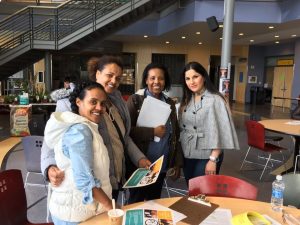 Zozan with fellow advocates.[/caption]
A clerical error over a date in her documentation caused all of that to be put on hold. She spent the next five years in legal limbo – all documentation had been revoked. And while her siblings all received citizenship, she was working with an immigration lawyer. Deportation loomed as an ever-present threat. Immigration officials told her not to worry, that in the event of deportation she would receive $200 and a plane ticket to Baghdad. As if a small amount of cash and a plane ticket to an unfamiliar city felt reassuring.
In the end, she was approved for a green card with the condition that she would never visit the middle east. During this process, Zozan learned the power of helping people gain a voice. Just hearing other people’s stories and volunteering allowed her to forget her own problems for a short time. She found herself providing language support to newcomers and soon after became a medical interpreter.
[caption id="attachment_1441" align="alignleft" width="300"]
Zozan with fellow advocates.[/caption]
A clerical error over a date in her documentation caused all of that to be put on hold. She spent the next five years in legal limbo – all documentation had been revoked. And while her siblings all received citizenship, she was working with an immigration lawyer. Deportation loomed as an ever-present threat. Immigration officials told her not to worry, that in the event of deportation she would receive $200 and a plane ticket to Baghdad. As if a small amount of cash and a plane ticket to an unfamiliar city felt reassuring.
In the end, she was approved for a green card with the condition that she would never visit the middle east. During this process, Zozan learned the power of helping people gain a voice. Just hearing other people’s stories and volunteering allowed her to forget her own problems for a short time. She found herself providing language support to newcomers and soon after became a medical interpreter.
[caption id="attachment_1441" align="alignleft" width="300"]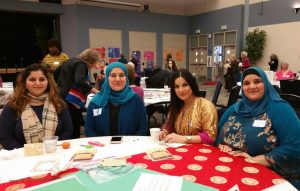 Zozan with her sisters.[/caption]
While she still thinks about going back to school, her dreams now are a little different that they were in high school. Instead of children, she is now more focused on supports for refugee parents. Kids learn faster than their parents and are the focus of a lot of support already. Zozan believes parents need a lot of extra support in cultural and language barriers. For now, she does this through medical interpreting and as an assistant teacher in the ESL department at Highline College. “If someone needs help and I can do it, I will be there. If I can’t do it, I will try.”
In her spare time, Zozan runs a catering company with her sister and advocates for food system change in South King County. Becoming a FIN Food Advocate was a natural fit because she is passionate about helping people see their options and keep moving toward the future. She and her sister have also received training and help in their business through FIN. “You get and you give,” she says, “it’s a circle that way.” She asks us all to be open to possibility, if you don’t try new things and ask for help you will never get what you want.
Zozan with her sisters.[/caption]
While she still thinks about going back to school, her dreams now are a little different that they were in high school. Instead of children, she is now more focused on supports for refugee parents. Kids learn faster than their parents and are the focus of a lot of support already. Zozan believes parents need a lot of extra support in cultural and language barriers. For now, she does this through medical interpreting and as an assistant teacher in the ESL department at Highline College. “If someone needs help and I can do it, I will be there. If I can’t do it, I will try.”
In her spare time, Zozan runs a catering company with her sister and advocates for food system change in South King County. Becoming a FIN Food Advocate was a natural fit because she is passionate about helping people see their options and keep moving toward the future. She and her sister have also received training and help in their business through FIN. “You get and you give,” she says, “it’s a circle that way.” She asks us all to be open to possibility, if you don’t try new things and ask for help you will never get what you want.
The 2nd Annual FIN Resource Fair is Here!
We are excited to host the 2nd Annual FIN Resource Fair May 12th from 5:30-8pm at Foster High School. This year we will be bringing together resources for both entrepreneurs and community members. Folks can get help starting a food business, finding a job in the food industry, or taking food and nutrition classes. More than 20 resource providers will be participating. We will have fun children’s activities and feature food from the FIN entrepreneurs. Join us in celebrating the diversity of South King County through food! If you are interested in coming or want to invite others, visit us on Facebook.
Soozveen Catering
Startup Q&A: Soozveen Catering
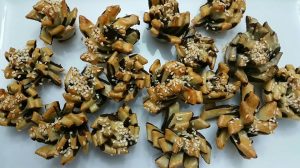 mother, and aunts cook all the time. From memorized family recipes, they cooked complicated dishes without measuring a thing, and even when they were exhausted. It was when our mother got sick that we started helping out more in the kitchen. We would cook so much food and then take it to Highline College, where we were working at the time - and still work.The staff and teachers would tell us we made so much food that we should just open a restaurant. Dean Alice Madsen was the first to seriously encourage us to think seriously about opening a business and connected us with classes and support.. We thought it was just going to be a side job and that it would not become anything real but before we knew it there were orders coming in and we were going through the process to formalize our business.
Q: What makes you different from other types of catering business?
We cook with love. Soozveen actually means ‘the promise of love’. We have a true passion for this work and care about everything from flavors to presentation. There are a lot of Mediterranean/Iraqi restaurants but we are one of only two Kurdish in King County. We are unique in our use of spices that we get from Northern Iraq – it’s really the taste of the land. Our specialty is our stuffed grape leaves (dolma) and baklava.
Q: What is your business’ biggest challenge?
mother, and aunts cook all the time. From memorized family recipes, they cooked complicated dishes without measuring a thing, and even when they were exhausted. It was when our mother got sick that we started helping out more in the kitchen. We would cook so much food and then take it to Highline College, where we were working at the time - and still work.The staff and teachers would tell us we made so much food that we should just open a restaurant. Dean Alice Madsen was the first to seriously encourage us to think seriously about opening a business and connected us with classes and support.. We thought it was just going to be a side job and that it would not become anything real but before we knew it there were orders coming in and we were going through the process to formalize our business.
Q: What makes you different from other types of catering business?
We cook with love. Soozveen actually means ‘the promise of love’. We have a true passion for this work and care about everything from flavors to presentation. There are a lot of Mediterranean/Iraqi restaurants but we are one of only two Kurdish in King County. We are unique in our use of spices that we get from Northern Iraq – it’s really the taste of the land. Our specialty is our stuffed grape leaves (dolma) and baklava.
Q: What is your business’ biggest challenge?
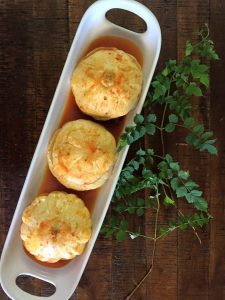 Q: What types of services or programs have been helpful?
StartZone at Highline College has a lot of workshops around marketing, labelling, accounting. Project Feast helped us in nutrition and food safety. FIN has helped us to get our business license and permits and to connect us with more people – to help us build our network. Ventures provided training to help us understand how to plan and run a business.
Q: What would you say to other small food business owners thinking of working with FIN?
There are so many opportunities out there, you just have to believe in yourself. But at the same time, be prepared. There are a lot of logistics you need to learn – things will not happen right away and you need to take the time to be prepared and don’t react out of a sense of urgency. Believe in yourself and you must believe in any organization you are working with, the trust must be there when you are getting help from someone.
Q: What types of services or programs have been helpful?
StartZone at Highline College has a lot of workshops around marketing, labelling, accounting. Project Feast helped us in nutrition and food safety. FIN has helped us to get our business license and permits and to connect us with more people – to help us build our network. Ventures provided training to help us understand how to plan and run a business.
Q: What would you say to other small food business owners thinking of working with FIN?
There are so many opportunities out there, you just have to believe in yourself. But at the same time, be prepared. There are a lot of logistics you need to learn – things will not happen right away and you need to take the time to be prepared and don’t react out of a sense of urgency. Believe in yourself and you must believe in any organization you are working with, the trust must be there when you are getting help from someone.
FIN’s newest staff member shares views on cultural identity as an Iraqi-American.
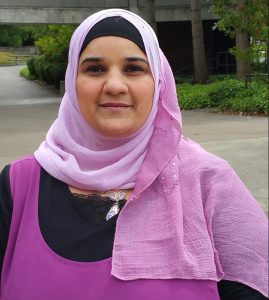
Sheelan Shamdeen, FIN Program Assistant
Sheelan Shamdeen, a Kurdish-Iraqi refugee, began working with FIN as a graduate of Project Feast’s Apprenticeship Program. Also a client of StartZone at Highline College, she and her sister found support in planning their own Iraqi catering company - Soozveen. But catering is only a small part of her story. In fact, Sheelan looks at their catering company as tool to bridge her two identities as a Kursdish-Iraqi refugee and an American citizen – food is a platform for dialogue she says. “We had 24 hours to leave and weren’t sure where we were going.” Sheelan and her family fled Iraq in 1996 when Saddam Hussein announced anyone associated with the UN would be publicly hanged. They, along with countless others, spent 3 nights under a tent with no passports - their only keepsake from home a teddy bear her sister had saved. Although they were safe once they reached Turkey, they had a long unknown journey ahead of them. Arriving in Guam, many families squeezed into tight living quarters for months while official paperwork was filed to enter the US with green cards. Twenty years later Sheelan, her mother, and seven siblings are all US citizens. Many of those years have been spent teaching English to other immigrants and refugees at Highline College. Although she remembers every detail of her life in Iraq, she also embraces American culture and encourages newcomers to do the same. “Many refugees feel this is only temporary – that this is not their home. But this is the place that helped my family survive and I believe I have two homes now.” To her, she is truly accepted in America as a human being - not a Muslim or an Iraqi but as a person. Despite the things sometimes said in media and politics, she feels like she belongs here. Sheelan doesn’t want any immigrant to lose their language or culture but believes it is important to also feel at home here. In America it is possible to celebrate both patriotism and cultural diversity in the same breath. Sharing Iraqi food with people is just one way that she can start conversations about cultural identity. Over two years have passed since Sheelan was first introduced to FIN. She was part of the first group of Community Food Advocates, recently joined the first cohort FIN Entrepreneurs and, in September 2016, took a staff position as FIN’s Program Assistant. Being a refugee means Sheelan knows what it feels like to start something from nothing. She brings compassion into her work and is quick to respond in a moment of need. All she asks of those around her is to be open minded.
Sheelan's advice to all people: “Ask questions before assuming you know someone’s story. Keep learning –there are so many free resources out there. And if you can’t find anything to learn then start a conversation with someone new.”
Over two years have passed since Sheelan was first introduced to FIN. She was part of the first group of Community Food Advocates, recently joined the first cohort FIN Entrepreneurs and, in September 2016, took a staff position as FIN’s Program Assistant. Being a refugee means Sheelan knows what it feels like to start something from nothing. She brings compassion into her work and is quick to respond in a moment of need. All she asks of those around her is to be open minded.
Sheelan's advice to all people: “Ask questions before assuming you know someone’s story. Keep learning –there are so many free resources out there. And if you can’t find anything to learn then start a conversation with someone new.”
by Allison Mountjoy January 9, 2017, 10:30AM PST
Jaqueline Garcia: Community Food Advocate
From Motherhood to Social Justice Activista
At 31, Jaqueline Garcia is a force of nature. From empowering Latina mothers to small business advisor, it is motherhood that really fueled her ambition. Jaqueline left Mexico and a burgeoning dentistry practice when she and her husband moved to San Francisco. Intending to continue dentistry in the States, a different course began to unfold when they moved to Seattle and Jaqueline became pregnant. Although happy, she was very far away from her support system. Jaqueline explains: “this was a moment that I felt very isolated from family and depressed.” That moment was also the catalyst for her to become a community leader. (more…)Dieynaba Kouyate, Saran African Market
SeaTac business owner, Dieynaba, opened Saran African Market in 2010 in honor of her mother, Saran, who owned and operated a food wholesale and distribution business in Côte d’Ivoire. Dieynaba’s own journey began when she immigrated to the US in 2002, following the passing of both of her parents, with the goal provide financial support for her family back home. Her arrival to the US, however, was met with several drawbacks, one of them being her departure from university where she was studying math, physics, and chemistry. Instead of the promising land of opportunity, Dieynaba was met with a confusing immigration system and highly competitive job market. Language barriers, inability to continue school with her visa, and the high cost of living made it difficult to send money home.
Dieynaba found herself braiding hair to make ends meet, while she worked toward her entry into the US job market. Within that time she began to build a reputation for herself within the West African community and within Dieynaba noticed a vital need for more access to African goods within the community. By gathering community feedback she was able to open a shop that caters to her community's needs and showcases the cultural resources of many African communities. Saran African market carries goods that are otherwise hard for her community to find including food, personal products, clothing, and a hair braiding salon in the back.
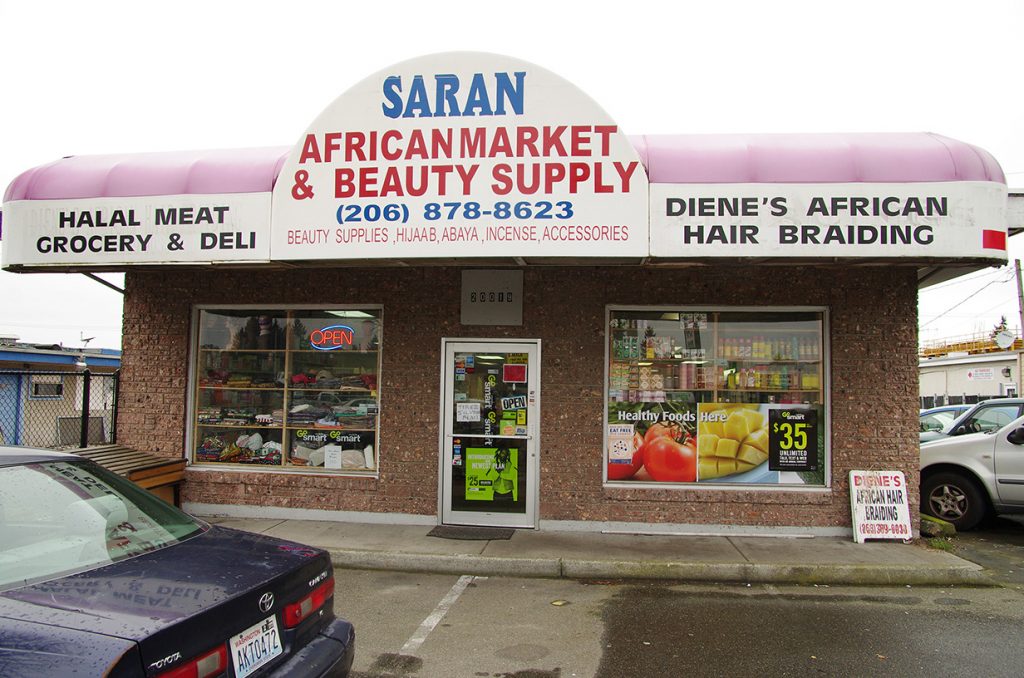 For the past five years her shop has grown in its success and popularity but with the introduction of the new light rail station, and rising costs of rent, the future of Dieynaba's business is filled with rising uncertainty. The 200th Street light rail station, less than a block away and scheduled to open late 2016, has come with the promise of increased store traffic and sales. Over a year of construction though, has brought only a crammed parking lot, off-putting noise from construction, and so much dust that Dieynaba has had to close her back-of-store salon.
Keeping stock of her most popular items, like smoked catfish and cassava products, helps the community stick with her during construction. She hopes these same products will bring in new customers from the station; some happy to find a reminder of back home and others seeking to experience the diversity of SeaTac. If the light rail station is able to deliver on such promises, Dieynaba will be able to take the next step in her business. While much of her food products are imported, Dieynaba dreams of a future where she owns a piece of land to grow and process some of these items locally.
[gallery link="file" ids="519,520,521,522,523,524,525,526,527"]
What advice does Dieynaba have for other budding entrepreneurs? “Save money and plan ahead. It’s good to have at least six months to a year’s worth of savings before opening a business, also take workshops in bookkeeping and cash flow as you’ll find them to be helpful with your business.”
For the past five years her shop has grown in its success and popularity but with the introduction of the new light rail station, and rising costs of rent, the future of Dieynaba's business is filled with rising uncertainty. The 200th Street light rail station, less than a block away and scheduled to open late 2016, has come with the promise of increased store traffic and sales. Over a year of construction though, has brought only a crammed parking lot, off-putting noise from construction, and so much dust that Dieynaba has had to close her back-of-store salon.
Keeping stock of her most popular items, like smoked catfish and cassava products, helps the community stick with her during construction. She hopes these same products will bring in new customers from the station; some happy to find a reminder of back home and others seeking to experience the diversity of SeaTac. If the light rail station is able to deliver on such promises, Dieynaba will be able to take the next step in her business. While much of her food products are imported, Dieynaba dreams of a future where she owns a piece of land to grow and process some of these items locally.
[gallery link="file" ids="519,520,521,522,523,524,525,526,527"]
What advice does Dieynaba have for other budding entrepreneurs? “Save money and plan ahead. It’s good to have at least six months to a year’s worth of savings before opening a business, also take workshops in bookkeeping and cash flow as you’ll find them to be helpful with your business.”
Floribert Mubalama, Community Food Advocate and Congolese Refugee
One of the highlights of FIN's 2015 Celebration was a presentation on refugee experiences. Floribert walked through the physical, psychological, and emotional impact of the Congo's last 20 years of war and the jarring loss of identity felt in the refugee camps. To him, this is a death and the transition to life in the US is like being reborn. Although transformative, arrival is also met with a loss of culture, lack of familiar foods, and a healthcare and social system that seems impossible to navigate. After spending only 1 year in the United States, Floribert is a leader in his local community. He currently works full time, attends school, participates as a Community Food Advocate, and in 2016 will begin co-chairing a FIN working group. What drives him? Floribert speaks of simple solutions to aid in integration and prioritizing supports for refugees to become successful citizens of the US.
